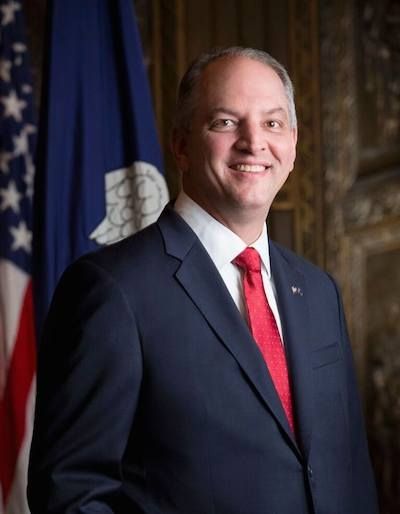
Hurricane Hell: Local family trapped on island for Irma has made it home
September 20, 2017
Woman etches the ‘F-word’ into victim’s car after dispute
September 20, 2017Attorneys representing Gov. John Bel Edwards and Attorney General Jeff Landry have taken a first step toward appealing a federal judge’s findings that Louisiana’s method of electing state judges in Terrebonne Parish is illegal.
A notice seeking appeal was filed on behalf of both defendants last week, signed by assistant attorneys general working the case and a new addition to the team, a hired legal gun from Virginia with a record of working high-profile voting rights cases and with close ties to the national Republican party.
U.S. District Judge James Brady declared last month in a 91-page decision that at-large election of Terrebonne judges violates Section 2 of the federal Voting Rights Act, and that the scheme was purposely devised to dilute black votes, thus preventing minority voters from electing a candidate of their choice to the bench. The case, brought by the Terrebonne Parish Branch of the NAACP and several of its members, is the latest in a series of efforts going back two decades seeking racially-based change in the parish’s courts.
Terrebonne NAACP President Jerome Boykin was pleased that the judge is moving forward with the remedy portion of the case, but had harsh words concerning the appeal.
“I am not surprised that a Tea Party attorney general would appeal a civil rights decision related to a Voting Rights Act violation,” Boykin said. “Judge Brady is obviously working a strict schedule on this case and not playing around. We have confidence that justice will be served.”
MODEL FOR SOLUTION
During a conference in chambers held Tuesday, Judge Brady gave the plaintiffs 40 days to file a proposal of up to 30 pages outlining a desired cure. The state may respond with a plan of its own within 30 days after that.
Gov. John Bel Edwards’ executive counsel, Thibodaux attorney Matthew Block, was present at the conference, and later said that the Attorney General – not the governor’s office – would be handling the appellate portion of the work.
“I had not been involved with this case in court until I attended the status conference,” Block said. “We now move into the remedy stage of this where the judge figures out the potential way to fix it. The judge made it clear that any remedy stage would be after the next legislative session. This will allow discussion with the legislative leadership and the local delegation to see what their intentions are and whether they are looking to address this. I don’t know what the remedy stage would look like. The attorney general and the governor cannot do it alone, they can’t make any alteration to a judicial district. That is the provenance of the legislature. The judge also made clear that if the legislature does not act he is going to move toward his own solution.”
A model for a solution presented during the eight day trial, from the plaintiffs, was a division of the 32nd Judicial District – which covers all of Terrebonne Parish – into five sub-districts. One is a C-shaped district that joins portions of Schriever, Gray, Houma and Gibson into one district with a majority black population.
Parish President Gordon Dove, a long-time opponent of creating a minority sub-district, has branded that plan a “Balkanization” of the parish, and unacceptable. In his decision, Judge Brady indicated that the district appears to meet the criteria for a “majority minority” district that can cure Voting Rights Act violations.
“SLAP IN THE FACE”
Leah Aden of the New York-based NAACP Legal Defense Fund, which represents the local NAACP branch in the case, was pleased to see Block in attendance at the trial conference.
“This would indicate to me that the governor’s office is taking the judge’s order seriously,” said Aden, who plans to fight any attempts at an appeal.
Jerome Boykin, however, has taken less comfort from Block’s appearance at the status conference.
That Gov. Edwards would allow Landry to appeal on his behalf, Boykin said, causes him to doubt the sincerity of any statements indicating he would work toward settling the matter through the legislature.
“It is a slap in the face to black people who helped elect him to become governor, and without our support he wouldn’t be governor,” said Boykin, who expressed little surprise that Landry was going through the additional expense of hiring additional counsel in the form of Jason Torchinsky, the lawyer from Virginia.
“That is another person standing in the way of justice, just like the governor and the attorney general,” Boykin said.
Torchinsky is a partner in the firm Holtzman Vogel Josefiak Torchinsky, a firm favored by right-wing political action committees which has played a key role in voting rights act cases. Jill Holtzman Vogel, Torchinsky’s partner, is a three-term Virginia state senator and former chief counsel for the National Republican Committee, who is now running for lieutenant governor. Torchinsky, former deputy counsel for the RNC, is no stranger to Louisiana. He was hired in 2011 to represent the state legislature here during congressional reapportionment.
MORE NEW FACES
The firm came under sharp criticism for its representation of Republicans led by former North Carolina governor Pat McCrory that publicly accused hundreds of voters in that state of fraudulent voting practices. In a number of cases the accusations were proved false, based on incorrect or misinterpreted information.
Torchinsky did not return a message left for him at the firm’s Washington D.C. office last week.
Two additional assistant attorneys general last week were added to the roster of lawyers representing the state in the NAACP case.
On the plaintiffs’ side, a leading attorney from the NAACP Legal Defense Fund was also added to the team.
Janai Nelson, the Fund’s associate director-counsel and a professor at St. John’s University Law School, was admitted to the case.
Recognizing that they may soon play be asked to play a role in crafting a resolution to the Voting Rights Act violation, some local legislators are studying the complexities and say they are prepared if asked to consider possibilities.
If local lawmakers are unable or unwilling to prepare legislation that could lead to a minority sub-district or some other solution, the plaintiffs have the option of seeking help from others in Baton Rouge, including the Black Legislative Caucus.











